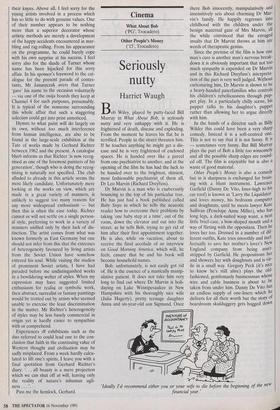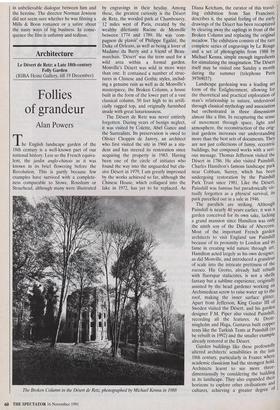Cinema
What About Bob (`PG', Trocadero)
Seriously nutty
Harriet Waugh
Bob Wiley, played by putty-faced Bill Murray in What About Bob, is seriously nutty and very unhappy with it. He is frightened of death, disease and exploding. From the moment he leaves his flat he is terrified. People in the street threaten him. If he touches anything he might get a dis- ease and he is very frightened of enclosed spaces. He is banded over like a parcel from one psychiatrist to another, and at the opening of the film he has had the luck to be handed over to the brightest, shiniest, most fashionable psychiatrist of them all, Dr Leo Marvin (Richard Dreyfuss).
Dr Marvin is a man who is exuberantly bouncing to the top of his particular tree. He has just had a book published called Baby Steps in which he tells the neurotic reader how to overcome their problems by taking 'one baby step at a time', out of the room, down the elevator and out into the street, as he tells Bob, trying to get rid of him after their first appointment together. He is also, while on vacation, about to receive the final accolade of an interview on Good Morning America, which will, he feels, ensure that he and his book will become household names.
Bob, unfortunately, is not easily got rid of. He is the essence of a manically manip- ulative patient. It does not take him very long to find out where Dr Marvin is holi- daying on Lake Winnipesaukee in New Hampshire with his thoroughly nice wife (Julia Hagerty), pretty teenage daughter Anna and six-year-old son Sigmund. Once there Bob innocently, manipulatively and insensitively sets about charming Dr Mar- vin's family. He happily regresses into childhood with the children under the benign maternal gaze of Mrs Marvin, all the while cOnvinced that the enraged insults that Dr Marvin throws at him are words of therapeutic genius.
Since the premise of the film is how one man's cure is another man's nervous break- down it is obviously important that not too much sympathy is expended on Dr Marvin and in this Richard Dreyfuss's interpreta- tion of the part is very well judged. Without caricaturing him, Dr Marvin is shown to be a heavy-handed paterfamilias who controls his children's rebelliousness through pup- pet play. In a particularly chilly scene, his puppet talks to his daughter's puppet rather than allowing her to argue directly with him.
In the hands of a director such as Billy Wilder this could have been a very sharp , comedy. Instead it is a soft-centred one. This is not to say that it is not funny. It is — sometimes very funny. But Bill Murray plays the part of Bob a little too winsomely and all the possible sharp edges are round- ed off. The film is enjoyable but is also a waste of good material. Other People's Money is also a comedy but in it sharpness is exchanged for bruis- ing with a blunt instrument. Lawrence Garfield (Danny De Vito, knee-high to his car roof) is known as 'Larry the Liquidator and loves money, his bedroom computer and doughnuts, until he meets lawyer Kate Sullivan (Penelope Anne Miller), who has long legs, a dark-suited wasp waist, a neat little brief-case, a bow-shaped mouth and a way of flirting with the opposition. Then he loves her too. Dressed in a number of dif- ferent outfits, Kate tries smoothly and inef- fectually to save her mother's lover's New England company from being asset -
stripped by Garfield. He propositions her and showers her with doughnuts and is vir- ile in a small way. Gregory Peck (it's nice to know he's still alive) plays the old- fashioned, gentlemanly businessman whose wire and cable business is about to be taken from under him. Danny De Vito has an endless supply of one-liners which he delivers for all their worth but the story of boardroom skulduggery gets bogged down 'Ideally I'd recommend either you or your wife to die before the beginning of the new financial year.' in unbelievable dialogue between him and the heroine. The director Norman Jewison did not seem sure whether he was filming a Mills & Boon romance or a satire about the nasty ways of big business. In conse- quence the film is unfunny and tedious.











































































 Previous page
Previous page